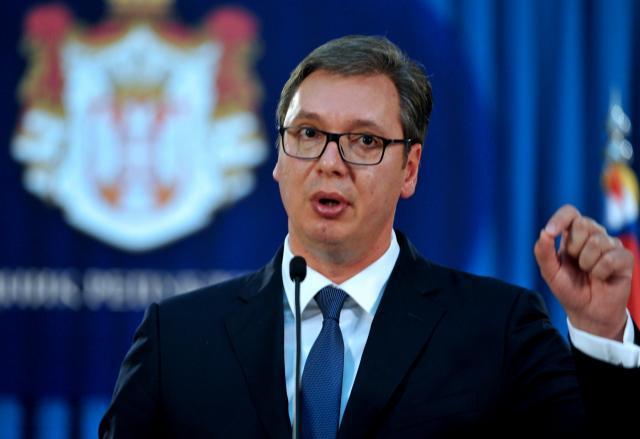President: Croatian protest, like Germans protesting to Jews
Serbian President Aleksandar Vucic said on Sunday he would like to see the text of a protest note Croatia sent to Serbia over the <a href="https://www.b92.net/eng/news/crimes.php?yyyy=2017&mm=07&dd=26&nav_id=101910" class="text-link" target= "_blank">Jasenovac</a> exhibition.
Monday, 29.01.2018.
09:20

President: Croatian protest, like Germans protesting to Jews
Vucic said that he would "then ask whether this is possible" - considering that historical facts about the concentration camp are quite clear."It's like somebody signing a protest note to Jews for marking Holocaust (Remembrance) Day, and that note arriving from Germany," Vucic told TV Pink.
He added that he "understood that we and Croatia can't agree on what happened 27 years ago" but "could not understand that we can't agree on what happened 72, 73 years ago."
The president stressed that there was no way to force Serbs to forget the suffering of their people, the terrible genocide and crimes committed in the former NDH-controlled areas of Bosanska Krajina, Herzegovina, but also Lika, Banija, and Kordun.
"It really is impossible, because it would be a crime to forget, but also not to remind in future of the horrible crimes that happened there - precisely so they are never repeated, and never happen again to any other people," Vucic stressed.
The Croatian protest note in question expressed "deep dissatisfaction with the statements made by Serbia's First Deputy PM and Foreign Minister Ivica Dacic at the opening of the exhibition.
Zagreb thinks Dacic was "abusing and manipulating with the Jasenovac victims for daily political purposes," and warned that "such untruths and insulting statements made toward Croatia and its officials bring into question the sincerity of Serbia's declarative statements about its desire for reconciliation and good neighborly relations."
Reacting to the protest note, Dacic told Tanjug that he was "stunned" by the hypocrisy and insolence at display, and remarked that the exhibition should have been organized by Croatia, rather than Serbia. He also rejected the accusation that his speech contained "false facts and data."
The speech
Ivica Dacic said at the opening of the Serbian-Jewish exhibition at the UN headquarters in New York - "Jasenovac - the Right Not to Forget" - that all kinds of historical revisionism denying crimes committed in WWII deserved public condemnation.The Serbian Ministry of Foreign Affairs quoted Dacic as saying on January 26 that the Jasenovac concentration camp had to remain one of the most important symbols of the suffering of Serbs, Jews, Roma and the anti-fascists of the time.
"We must not allow a forcible or perfidious change of the view of the past and historic facts, as it may soften and deny genocidal and criminal policies towards entire nations in the past. If we do not foster a culture of remembering, and if we are not careful enough, we risk a tragic destiny from the past repeating itself," Dacic explained.
The Serbian foreign minister added that the exhibition in New York was important to preserve the memory of the plight, and that the victims "killed for the ideals of a better and a more free world must not be in vain" and that it was also an opportunity for the international public to learn more about that less known chapter of WWII.
Dacic also said that Jasenovac as a memorial complex had not been addressed properly, and that one of the reasons was that the Ustashas (NDH ruling regime) had systematically destroyed their concentration camps, whereas Nazi camps were preserved and transformed into the places of education and remembrance. In addition, no comprehensive research has been carried out either, the minister cautioned.
"Unfortunately, a policy of suppression, oblivion and symmetry of crimes cannot compensate for what is a civilization debt not only to the dead, but also the living to face the crime, punish the culprits, carry out proper research and commemorate it," Dacic said.
The minister added that the latest memorialization of Jasenovac had provoked serious controversies, as the individualization of the victims dissolved their ethnicity or "race," which was "precisely the reason for the suffering of most of the prisoners."
"Such an approach should be viewed as part of a broader stream of reinterpreting the history of WWII and the Independent State of Croatia (NDH), in which the Jasenovac concentration camp has a very important role," Dacic warned.
The exhibition at the UN was organized as a contribution to Holocaust Memorial Day on January 27, declared by the UN to mark the liberation of Auschwitz concentration camp, Beta reported.


































Komentari 63
Pogledaj komentare